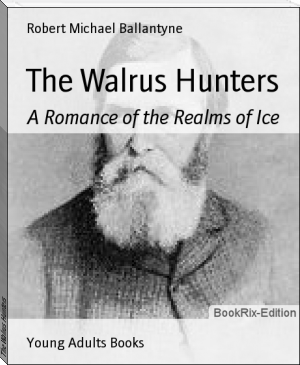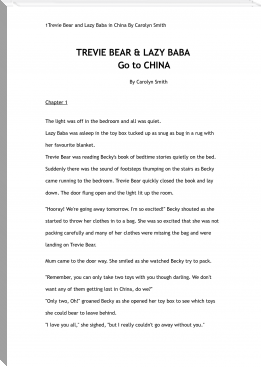The Walrus Hunters - Robert Michael Ballantyne (best book clubs .txt) 📗

- Author: Robert Michael Ballantyne
Book online «The Walrus Hunters - Robert Michael Ballantyne (best book clubs .txt) 📗». Author Robert Michael Ballantyne
An hour after the discovery of that cabin, there was not a man or boy in the tribe who was not going about with cut fingers, more or less. Experience, however, very soon taught them caution.
And here again the superior knowledge of Nazinred came in usefully. Like most Indians, he was a man of observation. He had seen the fur-traders in their workshops, and had noted their tools. Taking up a hand-saw he seized a piece of stick, and, although not an expert, sawed a lump off the end of it in a few seconds. As this would probably have cost an Eskimo full half an hour to accomplish with his blunt knives, they were suitably impressed, and Cheenbuk, seizing the saw, forthwith attempted to cut off the end of a rod of iron--with what effect it is scarcely necessary to explain.
In the course of a few days the quantity of material brought on shore was so great that it was found necessary to begin a second storehouse. While most of the natives were engaged on this, Cheenbuk and the Indian continued their researches in the ship, for a vast part of its deep hold still remained unexplored, owing partly to the slowness of the investigation in consequence of the frequent bursts of amazement and admiration, as well as the numerous discussions that ensued--all of which required time.
While going more minutely into the contents of the cabin, they came, among other things, on a variety of charts and books.
"Have you ever seen things like these?" asked Cheenbuk in a tone of veneration, based on the belief that the Indian had seen nearly everything the world contained.
"Never--except that," he replied, pointing to a log-book; "the traders use things like that. They open them and make marks in them."
Cheenbuk immediately opened the book in question and found marks--plenty of them; but of course could make nothing of them, even after turning them sideways and upside-down. As the Indian was equally incapable, they returned the whole into the locker in which they had found them, intending to carry them on shore when the new store should be ready for the reception of goods.
This was unfortunate, in some respects, as the next chapter will show.
CHAPTER TWENTY NINE.
CURIOSITY AND PRESUMPTION FOLLOWED BY CATASTROPHE.
Most of the able-bodied men and a few of the youngsters set off next day to obtain a supply of walrus, seal, and musk-ox flesh--or anything else that happened to be procurable.
Mrs Mangivik and other ladies were left to look after the camp and prepare for the return of the men, strict orders being left that no one should go on board the ship on any pretext whatever.
But strict orders are not always obeyed. There was one little boy in that community--not a bad boy, but a precocious and very ambitious boy-- who chanced not to hear the orders given. Whether he was partially deaf, or purposely did not hear the orders, we cannot say. This little boy's chief weakness was a desire to mimic. Having admired the wooden leg on Anteek's head, and having observed where Anteek had stowed the leg away before setting off with the hunters, he possessed himself of it, put it on his head, and strutted about the camp to the admiration and envy of all his compeers; for he was a very daring and domineering boy, although small. His name was Doocheek.
Another of Doocheek's weaknesses was a desire to ape the men, and think himself a man in consequence. This, coupled with a consuming curiosity in regard to Nazinred's tobacco-pipe, caused him to observe--for he was remarkably observant--that the Indian had, for the first time since he resided among them, gone off on an expedition and left his pipe behind him--accidentally, no doubt. Doocheek watched his opportunity and secured the fire-bag which contained the smoking implements. Stolen waters are sweet, even in cold climates where all the waters freeze, and the boy cast about for a secluded place in which he might enjoy the sweetness of his pipe to the full without fear of interruption. A blue cavern in an iceberg might do, but the atmosphere in such caves was rather cold. Under the cliffs there were many sheltered places, but the juvenile members of the community were playing there, and would certainly intrude. Out on the floes was an exposed place--to vision as well as to wind and drift. What was left to him, then, but the ship?
Hurrying through the village in order to carry out his plans, the boy encountered Mrs Mangivik at the entrance to her hut.
"Where are you going, Doocheek?" demanded the woman, with a look of suspicion born of frequent experience.
With that spirit of ambiguous contradiction which would seem to prevail among the youth of all nations, Doocheek replied, "Nowhere."
It is interesting to observe how that remarkable answer seems to satisfy inquirers, in nine cases out of ten, everywhere! At all events Mrs Mangivik smiled as if she were satisfied, and re-entered her hut, where Nootka was engaged in conversation with Adolay, while she taught her how to make Eskimo boots.
"Did not Cheenbuk forbid every one to go near the big kayak while the men were away?" demanded the woman.
"Yes he did," answered Nootka, without raising her eyes.--"Now look here, Ad-dolay. You turn the toe up this way, and the heel down that way, and shove your needle in so, and then--"
"I am very sure," interrupted Mrs Mangivik, "that little Doocheek has gone down there. There's not another little boy in the tribe but himself would dare to do it."
"He will lose some of his skin if he does," said Nootka quietly-- referring not to any habit of the Eskimos to flay bad boys alive, but to their tendency to punish the refractory in a way that was apt to ruffle the cuticle.
Quite indifferent to all such prospects in store for him, the boy hurried on until he reached the foot of the snow staircase. It had been repaired by that time, and the deck was easily gained. Descending to a part of the interior which was rather dark--for the boy was aware that his deeds were evil--he sat down on a locker and opened his fire-bag.
Eskimos are not quite free from superstition. Doocheek had plenty of natural courage, but he was apt to quail before the supernatural. Apart from the conscience, which even in Arctic bosoms tends to produce cowardice, the strange surroundings of the place--the deep shadows, merging into absolute obscurity, and the feeling of mystery that attached to everything connected with the vessel--all had the effect of rendering Doocheek's enjoyment somewhat mixed. To look at him as he sat there, glaring nervously on all sides, one would have been tempted to say that his was what might be called a fearful joy. If a rat or a mouse had scurried past him at that moment he would have fled precipitately, but no rat or mouse moved. Probably they were all frozen, and he had the place entirely to himself--too much to himself. He began at that point to wish that he had brought another little boy, or even a girl, with him, to keep up his courage and share in his triumphant wickedness.
However, as nothing happened, his courage began to return, and he emptied the contents of the bag on the locker. He knew exactly what to do, for many a time had he watched the Indian fill his pipe and produce fire with flint, steel, and tinder. Beginning with the pipe, he filled it, and then proceeded to strike a light. Of course he found this much more difficult than he had expected. It seemed so easy in the Indian's hands--it was so very difficult in his! After skinning his knuckles, however, chipping his thumb-nail, and knocking the flint out of his hand several times, he succeeded in making the right stroke, and a shower of sparks rewarded his perseverance.
This was charming. The place was so dark that the sparks seemed as large and bright as stars, while the darkness that followed was deeper by contrast. Forgetting the pipe and tobacco in this new-found joy, Doocheek kept pelting away at the flint, sending showers of sparks past his knees, and some of them were so large that they even fell upon the deck before going out.
But an abrupt stop was put to his amusement. Whether it was that something or other in the sides of the ship had given way, or the energetic action of the boy had shaken some fastening loose, we cannot say, but just as he was in the act of raising his hand for another _feu-de-joie_, a shelf over his head gave way, and a perfect avalanche of pots, pans, and noisy tin articles came down with a hideous crash on the deck!
To leap from the locker like a bomb-shell, and go straight up the hatchway like a rocket, was only natural. Doocheek did that as far as was compatible with flesh and blood. He could not remember afterwards by what process he reached the ice and found himself on the skirts of the village. But at that point his self-control returned, and he sauntered home--flushed, it is true, and a little winded, yet with the _nonchalant_ air of a man who had just stepped out to "have a look at the weather." His conscience was rather troubled, it is true, when he thought of the fire-bag and the pipe, etcetera, left behind, but nothing would have induced him to return for these at that time.
Towards evening the walrus-hunters returned. They had been very successful. The sledges were loaded up with the meat of several large animals, so that there was a prospect of unlimited feasting for more than a week to come.
"Now, old woman," said Cheenbuk with cheery irreverence to his mother, and with that good-natured familiarity which is often engendered by good fortune, "stir up the lamps and get ready the marrow-bones!"
Regardless of lamps and marrow-bones, all the children of the community, even to the smallest babes, were sucking raw blubber as children in less favoured lands suck lollipops.
"Had you to go far?" asked Adolay.
"Not far. We found them all close by, and would have been back sooner, but some of them fought hard and took up much time," answered Cheenbuk, who awaited the cooking process; for since he had discovered the Indian girl's disgust at raw meat, he had become a total abstainer on the point.
"And," he added, beginning to pull off his boots, "if your father had not been there with the spouter we should have been out on the floes fighting still, for some of the walruses were savage, and hard to kill."
After supper, as a matter of course, Nazinred looked round with an air of benign satisfaction on his fine face.
"Is my





Comments (0)